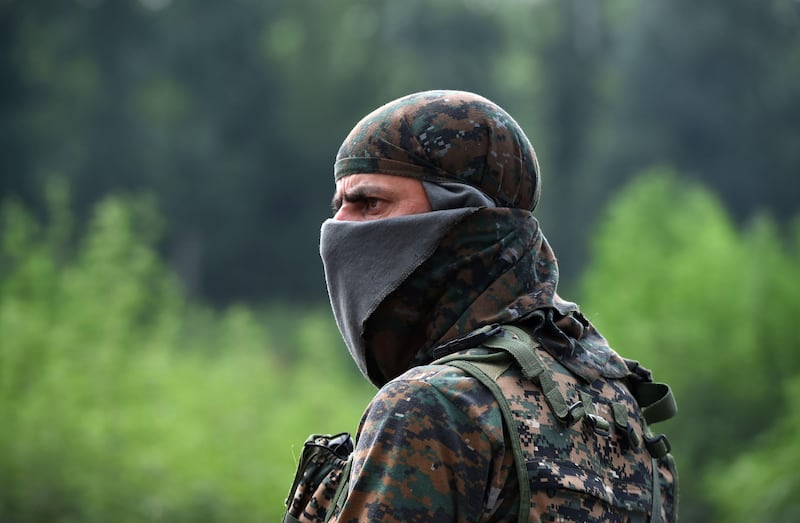Seven Hindu pilgrims, including six women, were killed and at least 19 injured when their bus got caught in an exchange of fire between militants and police in Indian-controlled Kashmir.
The bus, carrying 54 Gujarati pilgrims returning from the region's Amarnath shrine, came under attack late on Monday evening as it passed through the district of Anantnag near the town of Batengoo. Fighting had broken out in the area after militants attacked a police bunker and another police party at a checkpoint, injuring at least three officers.
Indian prime minister Narendra Modi condemned the bus attack, saying on Twitter: “Pained beyond words on the dastardly attack on peaceful Amarnath Yatris [pilgrims] in Jammu and Kashmir.
“India will never get bogged down by such cowardly attacks [and] the evil designs of hate.”
Prominent separatist leaders Syed Ali Geelani, Mirwaiz Umar Farooq and Yasin Malik, who are in favour an independent Kashmir, also condemned the attack.
“The incident goes against the very grain of Kashmiri ethos,” they said in a joint statement. “The Amarnath yatra has been going on peacefully for centuries and is part of yearly rhythm and will remain so.”
Security officials told local media that three men, suspected to be members of the militant groups Lashkar-e-Taiba and the Hizbul Mujahideen, were behind the attack. No arrests were made.
Lashkar-e-Taiba rejected the allegation, calling the attack "reprehensible", and accusing India of trying to sabotage the freedom struggle of the Muslim-dominated Kashmir region.
The pilgrimage, which starts in the city of Jammu and ends at the Amarnath shrine nearly 4,000 metres above sea level, began on June 28 this year and is expected to last for 40 days. Pilgrims take buses to the temple, where there is a stalagmite believed to represent the Hindu deity Shiva.
Monday’s attack came two days after the anniversary of the death of Burhan Wani, a Kashmiri militant killed by Indian security forces last year.
The route of the Amarnath pilgrimage — which began this year on June 28 and was scheduled to last 40 days — was suspended on the anniversary of Wani's death, as parts of the Kashmir valley were placed under curfew to prevent rallies or retaliatory attacks.
Even before the route opened this year, intelligence reports feared an impending attack.
“Intelligence input received from … Anantnag reveals that terrorists have been directed to eliminate 100 to 150 pilgrims and about 100 police officers and officials,” Muneer Khan, Kashmir’s inspector-general of police, wrote in a letter to the army. A leaked copy of the letter subsequently made its way onto social media.
“The attack may be in the form of stand-off fire on a yatra [pilgrimage] convoy, [an act] they believe will result in flaring of communal tensions throughout the nation.”
Due to the recent intermittent skirmishes between militants and Indian security forces in south Kashmir, extra security precautions were put in place for this year's pilgrimage, including the deployment of 40,000 paramilitary troops to guard the route.
In addition, pilgrims’ vehicles must be part of a convey under protection, are not permitted on the road after 7pm and must register with the Amarnath pilgrimage authorities that keeps track of vehicles on the route.
The bus involved in Monday evening's attack — which took place at 8.20pm — was travelling alone and was not registered with the relevant body, violating the security precautions.
It was the second such attack since 2000, when at least 30 people were killed in a heavy exchange of fire between militants and police near the town of Pahalgam — not far from Amarnath. Seventeen pilgrims, six residents, two security officers and two militants were killed in that attack.
Militants battling Indian rule in Kashmir have largely spared the pilgrimage, even during the most violent phases of their 28-year armed revolt.
About 150,000 pilgrims have already completed the journey to Amarnath and tens of thousands more are expected to do so by the time the pilgrimage ends in late August.
Monday’s episode did not result in a shutdown of the pilgrimage route.
On Tuesday morning, mere hours after the bus was attacked, 3,000 pilgrims set off afresh from Jammu to visit the shrine at Amarnath.
* Additional reporting by Reuters





